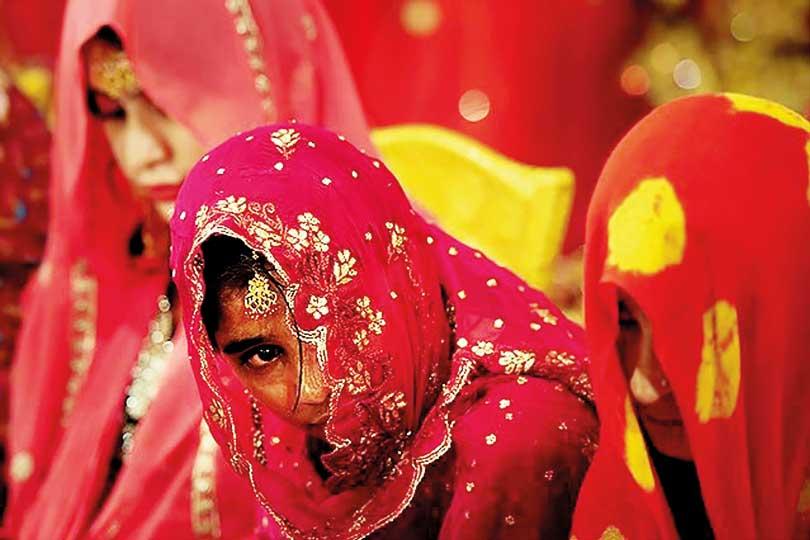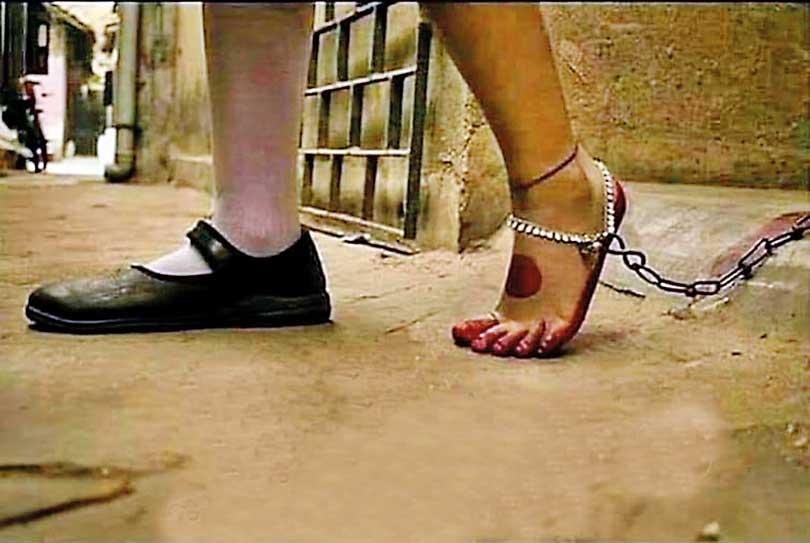22 Jan 2020 - {{hitsCtrl.values.hits}}

 At 26, Noor* was a divorcee, a widow and a mother of a 9 year-old-boy. She was married twice, first at the age of 17 and later at the age of 23. She was deserted by her first husband when she was 18, just days after their son was born. She later found out that her husband had been cheating on her and then applied for divorce. Noor had to bring her son up as a single mother. Her family married her off again, but four months after wedlock, her husband, who was a migrant worker, died abroad. Noor had been a bright student and wanted to study beyond her OLs, but her early marriage had buckled her plans. Now, she works odd jobs to support her family. “I am sick of life, I am only living now because of my son,” she lamented. Noor’s story is just one of the many unheard and unvoiced stories of the child brides in Sri Lanka.
At 26, Noor* was a divorcee, a widow and a mother of a 9 year-old-boy. She was married twice, first at the age of 17 and later at the age of 23. She was deserted by her first husband when she was 18, just days after their son was born. She later found out that her husband had been cheating on her and then applied for divorce. Noor had to bring her son up as a single mother. Her family married her off again, but four months after wedlock, her husband, who was a migrant worker, died abroad. Noor had been a bright student and wanted to study beyond her OLs, but her early marriage had buckled her plans. Now, she works odd jobs to support her family. “I am sick of life, I am only living now because of my son,” she lamented. Noor’s story is just one of the many unheard and unvoiced stories of the child brides in Sri Lanka.
Whilst in Sri Lanka, the General Marriage Ordinance (GMRO) states that the minimum age for marriage is 18; girls as young as 12 can get married under the Muslim Marriage and Divorce Act (MMDA). Whilst the Penal Code also states that the age of consent for sexual intercourse is 16 years of age, it exempts married Muslim girls between the ages of 12- 16. Due to this, Sri Lankan Muslim girls are married off before the age of 18 due to various reasons.
Speaking to , Juwairiya Mohideen of the Muslim Women Development Trust stated that child marriages happen due to various reasons such as poverty, economic constraints and affairs before marriage, but the main reason was because of provisions made for it in the law. “There are many reasons for child marriages and they mostly happen because it is legally allowed. It is not only the poor families living in rural areas that conduct child marriages. Even wealthy families in urban areas like Colombo conduct child marriages,” she revealed.
“Marriages at a younger age lead to higher rates of divorce”
-Mohideen
In statistics presented to the MMDA Reform Committee by the Registrar General’s Department, 83% of the underaged marriages in Colombo were between 16-17 years of age in 2013, 90% in Kandy in 2014, 92% in Puttalam between 2012- 2014 and 100% in Kalutara, Matara, Kurunegala and Kegalle in 2014. From 2014- 2016, 5491 marriages, where the bride was between 12-18 years, were registered under the MMDA constituting to a total of 9% of Muslim marriages.
Mohideen stated that most child marriages usually end up in divorces. “When the girl is married off young, she is not mature enough mentally or physically to deal with responsibilities that come along with being married nor is she able to carry on a family life. Even for the husband, the marriage can be stressful because the young bride is unable to fulfil his sexual desires and this leads to extra-marital affairs. Domestic and sexual violence too can be seen,” she said, adding that due to these problems, the bond is strained and even children suffer as a result. “In some instances, the children are abused or are exposed to the domestic and sexual violence inflicted on their mother,” she informed.
She also revealed that usually when the girls want to separate from their husbands, their families and members of the Muslim community in the area are against the idea and try their best to sustain the union. Most often, the girl files for divorce between the ages of 22- 25 after around 5-10 years of marriage. “At that time, the girl is sick of life and harbours anger against her parents and the society. Usually marriages at a younger age lead to higher rates of divorce,” Mohideen explained.
“Being married young affects their health”
-Subashini
These child brides get pregnant within a short period of time due to them not having knowledge of sexual and reproductive health and not being aware of contraceptives. “There was an instance where the girl didn’t know where the baby would be delivered from. These young mothers are also unaware of prenatal and postnatal care. They face complications during their pregnancy and childbirth due to inadequate care and them not being physically developed for these,” revealed Virgin Subashini, a volunteer at the Muslim Women Development Trust.
She also stated that these girls do not complete their education as schools don’t take them in after they are married. Usually, the families don’t let them continue with their education. “Even if they were to continue with their education, these girls would take contraceptive pills. These pills have numerous side effects and it can be detrimental to their health,” she opined.
Due to various issues in their matrimonial and family lives, these young girls get psychologically affected. “The age of 12- 18 is where young girls like to go out with friends and have fun. When they do not get an opportunity to do that, and instead take on responsibilities that are not meant for their age- they feel isolated and depressed. Sometimes, they even go to the extent of killing themselves because they are unable to bear the psychological strain,” she stated.
The founder of the Eastern Social Development Foundation, Mohammed Buhari is one of the few males who stepped in to prevent this injustice against women. “I believe in humanity and justice and that’s why I wanted to help out affected people. They’re suffering sans proper guidance,” he stated.
He revealed that when these child brides want to seek legal help from the law enforcement authorities, the authorities turn them away by telling them “We are unable to do anything. This is under your law”. This makes these girls legally powerless. He also stated that these girls are vulnerable to sexual favours and bribes. “The system should change and the law has to change as it legitimizes a crime,” he opined.
36 year Soraya* was married at 17. Though she was only able to divorce her husband last year, her husband was only with her during the first year of marriage. After that, he had been in and out of their house, having affairs with other women. Her husband was a heavy drinker and she recalled many incidents where he would abuse her after drinking. “Once he slapped me so hard that my tooth broke.” Even after divorce, he constantly came over to her place wanting her back with him, but she stood firm with her decision. “Now he doesn’t trouble me, but my life is ruined.
“They’re suffering sans proper guidance”
-Buhari
My family ostracised me because of the divorce and I have to support myself and my child by doing odd jobs,” she complained. 22 year old Yasmine* had filed for divorce from her husband, whom she had fallen in love with and married at 16. “When our families got to know about the affair, they married us off due to societal pressure. I was only happy with him for 2 years. When he started drinking, he stopped working. He didn’t allow me to go to work and expenses were mounting. My first son was born one year after our marriage and there wasn’t any money to pay for his basic needs like food and diapers. When I kept asking him to go to work, he started abusing me,” she reminisced. When they found out that Yasmine was pregnant with twins, her husband had tried to smother her to death with pillows when she was sleeping.
Another incident was when in a disagreement with her, he hit her with a chair. A piece of the chair had broken off and struck one of the twins who was playing in the vicinity. “He was still a baby. I rushed him to the hospital and he was bleeding from the head. I filed a complaint with the police and my husband was arrested. The case is still continuing, but he managed to obtain bail,” she said. Yasmine now lives with her parents and three kids. Her husband had abused her on various occasions. “He comes to my place and abuses me when I step out of the house. I can’t even go to work because he comes there and abuses me too. There are so many cases against him in court. I’ve filed so many complaints. He has been arrested on numerous occasions. The police told me to call 119 when he comes.
I did that and the police came promptly and arrested him. Yet, he isn’t deterred,” she says adding that she fears for her children’s safety. She recalled that when she was to appear at the first court hearing of their divorce case, he had stopped the tuk she was travelling on and abused her in a manner that she got a fit and fainted on the road. Badly shaken by the incident, she couldn’t step out for the next 6 months. As Yasmine recalls her gloomy past, her 5-year-old son runs around mischievously grinning at us. When asked from him if he wants his father, the mischievous grin is replaced with a frown and fear is seen in his eyes as he replied with a strong “No!”; his response bearing testimony that he had seen the atrocities committed to his mother by his father. Ruffling his hair, Yasmine looks despondent as she mulls over her future. “I fear for our safety. Now, my parents support us, but I don’t know how to take our lives forward when they aren’t there.
“I brought this bill on medical grounds, not to incite any racism”
-Dr.Wijemanne
I haven’t even done my OLs. I worked as a maid, but now, since my husband keeps threatening and abusing me at my workplace, I can’t work,” she said pointing at her son. She laments that she doesn’t have enough money to even put him to preschool. “If I was older, I would have known what qualities to look for in a life partner and I would have been better prepared for the responsibilities of family life...” she trails off, staring into space.
Mohideen stated that she was ostracized by her community for being vocal about these issues and they insult her and her family even at public gatherings. Some people have even tried to stop her workers and volunteers from coming to work by threatening them. Mohammed said that he was ostracized too because the men in the community believed that child marriages were an integral part of the culture and that he was dishonouring the culture by advocating against it. “The law legalizes this unethical process, making it difficult for the victims. The mentalities of some members in our community see our work as unethical, making it difficult for us to work,” he stated.
After hearing many complaints received by the Sectoral Oversight Committee on Women and Gender, of which she was a member, Dr. Thusitha Wijemanne came up with a private member’s bill to make 18 the minimum age for marriage and for it to be applied equally amongst all personal laws including the MMDA and the Kandyan Marriage and Divorce Act. Referring to her profession as a medical practitioner, Dr. Wijemanne said “This bill was presented on medical grounds. Between the ages of 12- 18, the girls are still developing. Their bodies aren’t physically fit for pregnancy, childbirth and labour. They aren’t mentally developed to handle family life or understand sexual feelings. My aim is to help the affected victims and minimise the number of such victims,” Dr. Thusitha Wijemanne said.
She also stated that provisions should be made to let these child brides and young mothers return to school. She added that provisions should be made to rehabilitate them. “They should learn some skills to help them lead their lives well, able to support their family,” said Dr. Wijemanne.
When they found out that Yasmine was pregnant with twins, her husband had tried to smother her to death with pillows when she was sleeping
With the rate of child marriages increasing in many parts of the island and decreasing in some places, where activists are actively lobbying against it- it certainly is a cause for concern as there will be an influx of young single mothers who are highly vulnerable.
Child marriages continuing to be legalised will only increase the number of victims like Noor, Soraya and Yasmine.
They were among the other victims of child marriage who had come to Colombo to pledge their support to the bill brought in by Dr. Wijemanne. “Our lives are ruined. We do not want more girls going through this and ruining their lives,” they said.

Most often, the girl files for divorce between the ages of 22- 25 after around 5-10 years of marriage
28 Nov 2024 15 minute ago
28 Nov 2024 1 hours ago
28 Nov 2024 3 hours ago
28 Nov 2024 3 hours ago
28 Nov 2024 4 hours ago